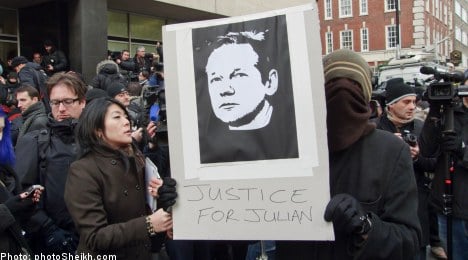The two-day hearing at a high security London court will examine a Swedish arrest warrant for the 39-year-old Australian, who won worldwide notoriety for his website’s release of thousands of secret US diplomatic cables.
Celebrity backers including socialite Jemima Khan will also lead rallies in London on Monday for Assange, who insists that sex assault claims made against the former computer hacker by two Swedish women are politically motivated.
The judge is expected to defer his decision in the case at Belmarsh Magistrates’ Court in south London. If the ruling goes against Assange he will be able to appeal the decision all the way to England’s supreme court.
His lawyers argue that if Assange is extradited to Sweden, he runs the risk of extradition or even illegal rendition to the United States where they say he could face the death penalty.
Assange was released on bail a week after his arrest on December 7 and has since been staying at a friend’s country mansion, under strict conditions including that he obey a curfew, wear an electronic ankle tag and report to police daily.
At the last hearing in January, the judge relaxed the conditions for Sunday and Monday, meaning Assange will be allowed to sleep on those nights at the Frontline media club in London while he attends court.
Swedish authorities say they want to question Assange over sex assault claims by the two women.
Swedish police reports filled with graphic details of the allegations leaked onto the Internet last week.
The police documents, viewed by AFP, contain the statement of the alleged rape victim alleging that Assange forced himself on her, without wearing a condom, while she was asleep.
The woman, identified only as Miss W, said she had had consensual sex with Assange earlier in the evening and had then fallen asleep with him, only “to wake up because he has forced himself inside of her,” the report said.
“‘She asked immediately: are you wearing anything?’ and he answered ‘you’,” it added. “She told him ‘You better not have HIV,’ and he answered ‘Of course not.'”
After that, Miss W. allowed the intercourse to continue.
The faxed documents also include a forensic report on the condom used during a sexual encounter with Assange’s other alleged victim, Miss A, who accused him of having deliberately broken the prophylactic.
The report says the condom had not been cut with scissors or a knife.
In a video message to a rally in Melbourne on Friday, Assange appealed to Australian Prime Minister Julia Gillard to help return him to his native land.
“Julia Gillard should be taking active steps to bring me home and protectour people,” he said.
After releasing hundreds of thousands of confidential US documents about the wars in Iraq and Afghanistan last year, WikiLeaks has in recent months been slowly publishing more than 250,000 leaked US diplomatic cables.
Assange now faces a widening criminal probe in the United States and has made powerful enemies in Washington.
Bradley Manning, a US soldier suspected of leaking the information to WikiLeaks, is in detention in the United States.
Assange has, meanwhile, stepped up a war of words with two leading newspapers that previously collaborated on the leaks but have now published accounts of their troubled dealings with him.
WikiLeaks recently threatened to sue The Guardian over its serialisation of “WikiLeaks: Inside Julian Assange’s War on Secrecy”, a book by the British newspaper’s journalists David Leigh and Luke Harding.
Extracts said Assange disguised himself as an old woman in order to evade US spies who he believed were following him. They also detailed how Assange eventually fell out with the paper.
Assange has also turned his fire on The New York Times after it too published a long piece detailing how their relationship crumbled.



 Please whitelist us to continue reading.
Please whitelist us to continue reading.
Member comments